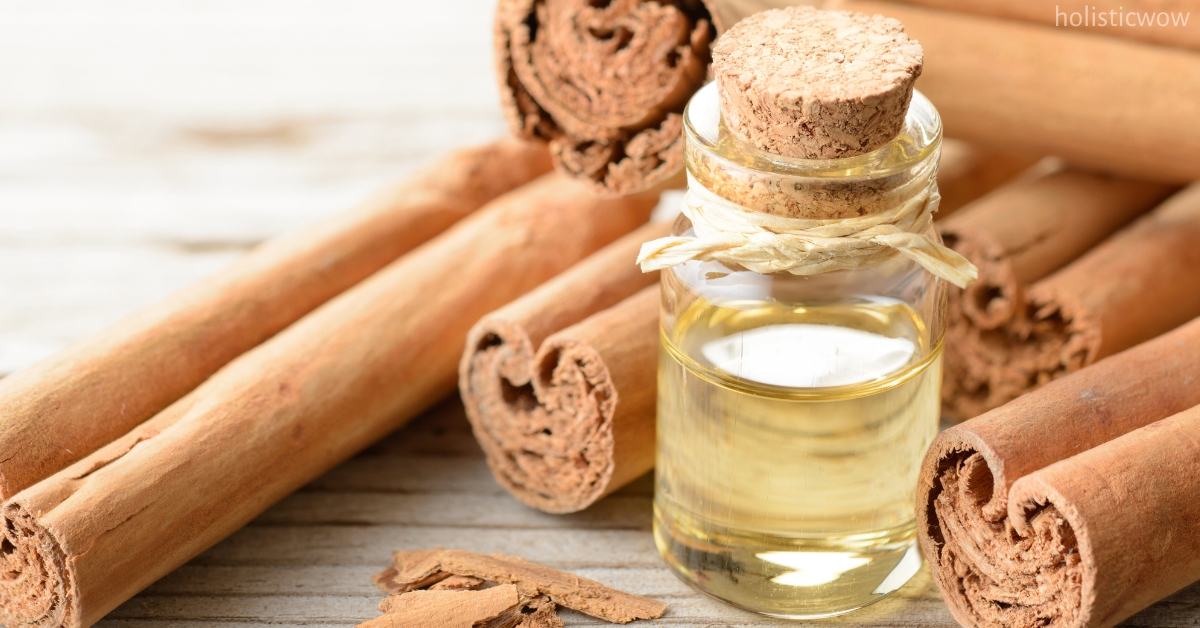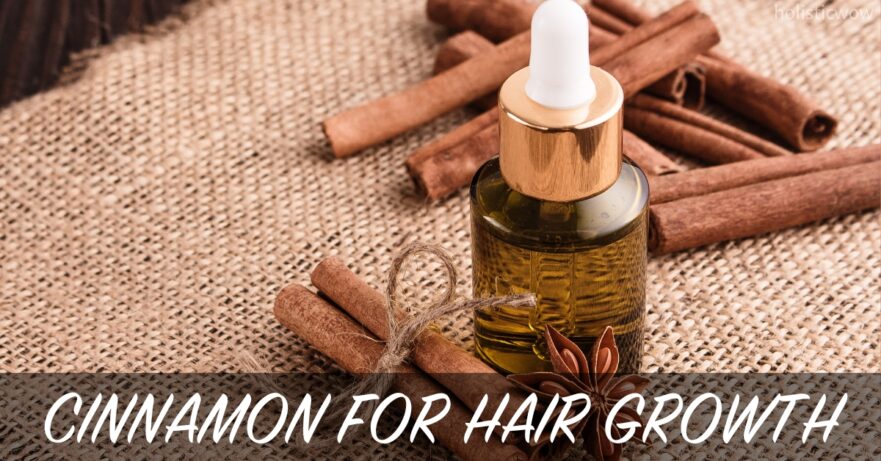What Are the Benefits of Using Cinnamon for Hair Growth?
Cinnamon offers several potential benefits for hair growth due to its antioxidant, anti-inflammatory, and antimicrobial effects.
These qualities may help support scalp health and create a more favorable environment for hair regrowth.
Cinnamon may help stimulate hair follicles by enhancing blood circulation in the scalp.
Improved blood flow could potentially promote new hair growth and strengthen existing strands.
Its natural antifungal properties may help prevent scalp infections and dandruff, both of which can contribute to hair loss.
By maintaining a clean and healthy scalp, cinnamon may help prevent hair loss.
Recent research suggests that compounds found in cinnamon, such as cinnamic acid, may activate pathways in dermal papilla cells—key cells involved in hair growth.
This includes activation of oxytocin receptors, which has been shown in organoid models to enhance trichogenic gene expression and hair peg sprouting.
Incorporating cinnamon into a natural hair care routine may contribute to improved scalp health and serve as a complementary approach to hair loss treatment.
While more clinical trials in humans are needed, early findings are promising for those exploring natural options for hair restoration.
Key Takeaways
- 🌿 Natural Hair Growth Booster: Cinnamon’s antioxidant, anti-inflammatory, and antimicrobial properties may enhance scalp health, creating an environment conducive to hair regrowth.
- 💆♀️ Improved Blood Circulation: By stimulating blood flow to the scalp, cinnamon may promote stronger hair growth and strengthen existing hair strands.
- 🪮 Scalp Protection: Cinnamon’s natural antifungal properties may help prevent infections and dandruff, both of which can contribute to hair loss.
- 🧪 DIY Hair Treatments: Incorporating cinnamon into hair masks and oils may support scalp health and serve as a complementary approach to traditional hair loss treatments.
What Are the Antifungal and Antioxidant Properties of Cinnamon?
Cinnamon has notable antifungal and antioxidant properties that may benefit scalp and hair health.
The antifungal properties of cinnamon help protect the scalp from infections, which can reduce potential causes of dandruff and irritation.
This protection supports a healthier scalp environment that may help create conditions favorable for hair growth.
Cinnamon’s antioxidant properties help combat oxidative stress, which is linked to hair loss and other scalp issues.
By reducing free radical damage, these antioxidants may help maintain healthy hair follicles and contribute to the prevention of hair loss.
Together, these natural hair care benefits contribute to better overall hair health by promoting a balanced scalp environment.

How Does Cinnamon Improve Scalp Health?
Cinnamon may help improve scalp health in part by supporting blood circulation.
This effect is linked to cinnamaldehyde, a natural compound found in cinnamon, which can help dilate blood vessels and potentially increase blood flow to the scalp.
Better circulation may help deliver more oxygen and nutrients to hair follicles, potentially supporting healthier hair growth.
Additionally, cinnamon possesses natural antimicrobial and antifungal properties, which may help prevent scalp infections.
Its anti-inflammatory properties can also reduce irritation and inflammation, creating a more balanced and comfortable scalp environment.
Together, these benefits—improved blood circulation, antifungal and anti-inflammatory properties, and scalp stimulation—may contribute to better overall scalp health and support healthy hair growth.
How Can Cinnamon Be Used in a Hair Care Routine?
Cinnamon may be a beneficial addition to your hair care routine through various methods, including hair masks and oils.
To create a nourishing cinnamon hair mask, mix cinnamon with honey and coconut oil, and apply it to the scalp.
This combination may help support scalp health and improve blood circulation, potentially promoting a healthier environment for hair growth.
Additionally, you can prepare a cinnamon-infused hair oil by combining cinnamon with a carrier oil, such as coconut or olive oil.
Gently heat the mixture to infuse the properties of cinnamon into the oil, then use it for scalp massages.
Massaging the scalp with cinnamon-infused oil may help stimulate blood flow and contribute to a healthy scalp environment for hair follicles.
Regular use of these DIY hair masks and hair oil treatments may contribute to stronger, healthier-looking hair over time.
What Are the Steps to Make a Cinnamon Hair Mask?
To make a cinnamon hair mask, start by combining 1/2 teaspoon of freshly ground cinnamon with 1 tablespoon of honey and a small amount of coconut oil.
Mix these ingredients until they form a thick paste.
Apply the mixture to your scalp, massaging gently to ensure even coverage. Leave the mask on for about 20 minutes before rinsing it off thoroughly.
Perform a patch test first to check for skin sensitivity.
Alternatively, you can create another version by mixing an egg with coconut oil and freshly ground cinnamon.
Apply this mixture to your scalp and let it sit for 30 minutes before washing it out.
These DIY hair masks use natural ingredients that may help support scalp health and hair regrowth.
How Can Cinnamon Tea and Rinse Support Hair Growth?
Cinnamon tea and rinse may support scalp health and contribute to conditions that favor hair growth due to the beneficial properties found in cinnamon.
When used as a rinse, cinnamon’s natural antioxidants and anti-inflammatory compounds may help improve scalp health, which is important for healthy hair growth.
These properties could potentially reduce inflammation and protect the scalp from free radical damage, creating a healthier environment for hair follicles.
To make a simple cinnamon tea or rinse:
- boil cinnamon powder in water,
- allow it to cool,
- and use this mixture as a final rinse after shampooing your hair.
This method allows the cinnamon rinse to deliver its benefits to the scalp in a gentler way than raw cinnamon, which may help support scalp health and create conditions favorable for hair growth over time.
However, more evidence is needed to confirm the effectiveness of rinses in delivering active compounds through the scalp barrier.

What Is Cinnamon Infused Hair Oil and How Is It Made?
Cinnamon-infused hair oil is crafted by combining a carrier oil, like coconut or olive oil, with cinnamon.
The mixture is gently heated to allow cinnamon’s beneficial compounds—such as cinnamic acid and cinnamaldehyde—to infuse into the oil.
This infused oil can then be used for scalp massages, which may help promote blood circulation and support scalp stimulation.
The process involves using low heat to ensure that the nutrients in both the cinnamon and the carrier oil remain intact while blending effectively.
This method helps maximize the potential benefits of cinnamon-infused hair oil for scalp health and may complement other treatments for hair regrowth.

Should You Use Cinnamon Oil Directly on the Scalp?
Using cinnamon oil directly on the scalp requires caution.
It’s best to dilute cinnamon oil with a carrier oil, such as coconut or olive oil, to reduce the risk of irritation.
Undiluted cinnamon oil can cause skin sensitivity or allergic reactions, especially on the scalp, which is more delicate.
Performing a patch test before full application is crucial to ensure no adverse reactions occur.
This approach helps maintain safety while potentially supporting scalp health through cinnamon oil’s natural properties.
While more research is needed, cinnamon oil is being explored as a natural option in hair loss treatment when used with proper precautions.
Who Should Avoid Using Cinnamon for Hair Care?
Individuals with sensitive skin, allergies to cinnamon, or those who experience scalp irritation should avoid using cinnamon for hair care.
It’s advisable to consult with a healthcare provider before trying new remedies, especially for those with existing skin conditions or sensitivities.
Performing a patch test can help identify potential allergic reactions.
Pregnant or breastfeeding women should also consult a healthcare provider due to limited safety data.
Herbal Preparations and Recipes for Hair Growth
Herbal remedies can support hair growth by utilizing the beneficial properties of various herbs. Cinnamon, known for its antioxidant, anti-inflammatory, and antifungal properties, may help enhance blood circulation to the scalp , promoting healthier hair growth. The following recipes incorporate cinnamon to help improve scalp health and stimulate hair growth. While some laboratory studies suggest potential benefits, human clinical trials are limited.
Always consult a healthcare provider before starting any new herbal regimen, particularly if you have existing health conditions or are taking medications.
Cinnamon Hair Growth Mask
Ingredients:
- ½ teaspoon freshly ground cinnamon
- 1 tablespoon honey
- 2 tablespoons coconut oil
Preparation:
- In a bowl, combine the cinnamon, honey, and coconut oil.
- Mix until you achieve a thick paste.
- Apply the mixture to your scalp, massaging gently to ensure even coverage.
- Leave the mask on for about 5-10 minutes if well tolerated.
- Rinse thoroughly with warm water.
Use this mask once a week to help improve scalp circulation and maintain scalp health, which may support hair growth.
Always perform a patch test before applying to the scalp.
Warnings: Cinnamon can cause irritation for some people. If you experience redness or discomfort, discontinue use. Avoid applying on broken skin or open wounds.
Herbal Scalp Nourishing Blend
Ingredients:
- 1 teaspoon freshly ground cinnamon
- 1 tablespoon dried nettle leaf
- 1 tablespoon dried rosemary
- 1 tablespoon dried chamomile
- 1 cup of boiling water
Preparation:
- Combine all the herbs in a teapot or heatproof container.
- Pour boiling water over the herbs and cover.
- Steep for 15 minutes.
- Strain the mixture and allow it to cool slightly.
Use this herbal rinse after shampooing your hair. Pour the mixture over your scalp and hair, massaging gently. Let it sit for a few minutes, then rinse it out with cool or lukewarm water. This can be done 1–2 times a week to soothe the scalp and support a balanced environment for hair health.
Warnings: Ensure that you are not allergic to any of the herbs used. If you have sensitive skin or scalp conditions, consult a healthcare provider before use. Store any leftover rinse in the refrigerator and use within 48 hours.
These herbal preparations utilize the properties of cinnamon and other supportive herbs to create a healthier environment for hair growth. Regular use may contribute to stronger, healthier hair over time. Always consult a healthcare provider before starting any new herbal regimen, particularly if you have existing health conditions or are taking medications.

